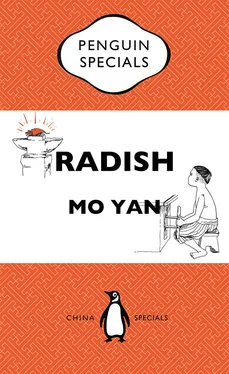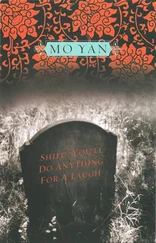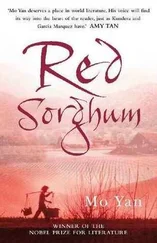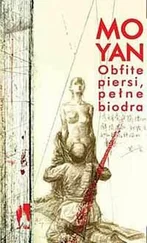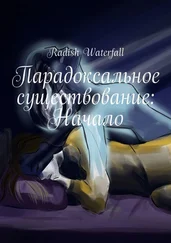The young blacksmith stood in his customary pose next to the chisels, holding his sledge in both hands, head cocked to the side, his good eye staring straight ahead, like a contemplative rooster.
The old blacksmith removed a heated chisel from the forge; Hei-hai took a ruined one and laid it in its place. The heated chisels were white tinged with green. The old blacksmith laid the chisel on the anvil and tapped the side of the anvil with his ball-peen hammer. The younger man lazily raised his sledge, twirled it in the air, as if it were a jute stalk, and let it fall gently onto the hot steel, sending sparks of molten steel flying in all directions. They burst into smaller sparks as they hit the wall. Some landed on Hei-hai’s slightly bulging belly, bouncing off softly and tracing lovely arcs of light before falling to the ground. As the sparks met his belly and fell to the ground, their friction with the air created heat and sound. After the first strike with his sledge, the young blacksmith flexed his muscles, as if he’d been suddenly awakened, and began to move faster. Juzi saw strange shadows dancing on the rocky wall and heard the clang, clang, clang of metal on metal. The blacksmith’s ability to shape steel was exceptional, and the hammer in the old man’s hand had nothing to do but tap the anvil. The young man knew precisely where to aim. The old master turned chisels on the anvil, his eyes and thoughts lighting on the spots to strike, and the young man’s sledge landed there an instant later, sometimes anticipating the older man.
Juzi was awestruck by the young man’s skill, though she also kept an eye on the boy and the old blacksmith. Hei-hai stood numbly by when the hammering was at its most impressive (eyes shut, breathing in time with the bellows); that was also a sad moment for the old blacksmith, as if each swing of the young man’s sledge was aimed not at the chisels but at his dignity.
When the chisel was shaped, the old man turned to quench it in the bucket. He cast a meaningful glance at the younger man, the corners of his mouth turning down disdainfully. The younger man watched his master’s every move. The woman saw the older blacksmith test the water with his hand, then raise the chisel to examine it before bending over, shrimp-like, looking closely at the water in the bucket, and tentatively dipping in the tip. The water sizzled and sent a fine steam into the air, where it enveloped the old man’s red nose. After a moment, he again raised the chisel to his eyes, as if preparing to thread a needle, as if a wonderful design were painted there. He was obviously happy with what he saw, as the wrinkles on his face filled with pleasure. He nodded, seemingly having received the response he’d hoped for, then buried the chisel in the water. Steam billowed, a mushroom cloud that filled the bridge opening, turning the gaslight red and the other objects into a shifting blur. All returned to normal when the steam dissipated: Hei-hai still dreamily pumped the bellows; the young blacksmith remained in his customary contemplative rooster pose; and the old blacksmith — his date-like face, black enamel eyes, and arms with scars like dung beetles — had not moved.
The old blacksmith picked up a second chisel, and everything began again, right up to the moment when he was about to quench it — then something changed. After testing the water, he added cold water, and looked satisfied. Just as he was about to put the chisel in, the young blacksmith bounded over to the bucket and stuck his right hand in. Without a second thought, the old man thrust the chisel against the younger man’s right forearm. The smell of burning flesh surged from under the bridge, straight into the woman’s nostrils.
The young blacksmith screeched in pain, straightened up, and, with a nasty grin, shouted, ‘It’s been three years, Master!’
The old man dropped the chisel into the bucket, roiling the water inside and once again filling the opening with steam. Juzi could not see their faces in the mist, but she heard the old man say: ‘Remember this!’
She ran off before the mist cleared, clamping her hand over her mouth to keep down the bitter juices churning in her stomach. As she sat before the rock pile, one of the women teased her: ‘You’ve been gone a long time, Juzi. Out with that boy in the jute field?’ Juzi did not respond, letting the ridicule pass. She pinched her throat with two fingers to keep from making a sound.
The whistle to stop work blew. Juzi had been caught up in her thoughts for three hours. ‘Thinking about a man, Juzi? Let’s go,’ they called to her. But she sat there watching figures move in the hazy light.
‘Juzi.’ The young mason was standing behind her. ‘Your cousin asked me to give you a message. She wants you to spend the night at her place. I’ll go with you, all right?’
‘Go? Who are you talking to?’
‘I’m talking to you. What’s the matter? Are you sick?’
‘Is who sick?’
‘I’m talking about you.’
‘Well, don’t.’
‘Shall we go?’
‘OK.’
The water passed noisily under the bridge. Juzi stopped. The mason was only a step away from her. Turning to look, she saw light emerge from the opening at the westernmost pylon. The other two gaslights had been extinguished. She began walking toward the floodgate.
‘Looking for Hei-hai?’
‘I want to see him.’
‘Let’s go together. The little bastard. Be careful, don’t fall off the bridge.’
Juzi sensed that the mason was close; she could hear his heartbeat. They walked and walked, and as her head tilted to the side, it came to rest on his powerful shoulder. She leaned back and was immediately embraced by a muscular arm. He reached over, cupped the little mound of her breast with his big hand, and stroked it. Her heart beat frantically beneath that breast, like a fluttering pigeon. They walked steadily toward the floodgate. When they entered the circle of light, she removed his hand from her breast and, sensibly, he let his arm drop.
‘Hei-hai!’ she shouted.
‘Hei-hai!’ he echoed her.
The young blacksmith looked at both of them with his good eye; his cheek twitched. The old blacksmith was sitting on his bed, holding his pipe in both hands, as if it were a pistol. He glanced at Juzi — dark red — and then the mason — pale yellow — and said in a weary but kindly tone, ‘Sit down and wait, he’ll be right back.’
Empty water bucket in hand, Hei-hai climbed up the levee.
When the workday had ended earlier that day, the young blacksmith had stretched lazily and said, ‘I’m famished. Hei-hai, take a bucket to the north field. Dig up some sweet potatoes and pick some radishes for a late-night snack.’
Sleepy-eyed, Hei-hai looked at the old blacksmith, who was sitting on his bed, looking like a defeated rooster with its feathers ruffled.
‘What are you gawking at, you little son of a bitch?’ the young one demanded, straightening up and stretching his neck. ‘Do as I tell you.’ His good eye swept across his master, collapsed on his bed. Pain shot through the burn on his arm, but the pleasure that arm had brought him overcame the pain, and the temperature was just right, absolutely wonderful.
Hei-hai shuffled off with his empty bucket. As he emerged from the bridge opening it was as if he’d fallen into a well with a thump; he was enshrouded in such utter darkness that hazy lights flared in his eyes. He crouched down fearfully and shut them. When he opened them again, the sky had changed — now starlight fell warmly upon him and on the dark grey ground all around.
On the levee, branches of the river locusts stretched and intertwined. He reached up to part them with one hand, then hunched his shoulders and walked up the slope. His hand brushed against the full, ripe seedpods on the damp tips of branches; the pungent scent of the branches assailed him. His foot bumped into something soft and warm, and he heard a chirp. Before he realised that it was a bamboo partridge, the bird had flapped its way out of the brush and landed in a jute field like a dark stone. Feeling somewhat guilty, he touched the spot where the bird had been resting with his foot. It was dry, a clump of dry grass that still retained the bird’s warmth. From where he stood on the levee he heard the woman and the mason shout his name. He banged on the side of his bucket, and the shouts stopped. He heard the river rushing forward brightly, and the screech of an owl on a tree somewhere in the village. His stepmother was afraid of two things: thunder and the screech of an owl. He wished there were thunder every day, and a screeching owl at his stepmother’s window every night. The dew on the river locusts wetted his arms, which he wiped dry on his shorts as he crossed the levee road and started down the other side. By then he’d gotten used to the dark and could see clearly, could even distinguish the subtle difference between the brown of the soil at his feet and the purple of the sweet potato leaves. He crouched down, pulled up one of the sweet potatoes and tossed it into his bucket, where it rattled around. He dug some more, until he felt something drop off his finger, and heard it bounce off a sweet potato leaf. Feeling his left hand with the right, he discovered that the damaged fingernail had fallen off. By now his bucket was heavy, so he stood up and headed north. When he reached the radish field, he picked six in a row, twisted off the leafy tops, threw them to the ground and tossed the radishes into his bucket.
Читать дальше
